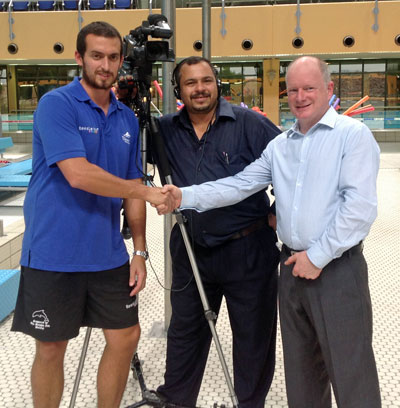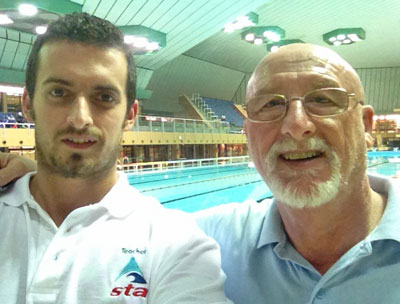The Old Dogs Teaching the New Puppy Tricks
It was 23:15, we had been up since 07:30 and my eyelids were barely staying open. The gentleman sitting opposite me was enthusiastically recounting another tale from his huge experience on swimming teaching – this time on how to deal with a male-only group of Army recruits.
I had been working all day with this guy and had tutored a course; he was still brimming with energy, while I was still struggling to stay awake.
“David, I am sorry buddy; I am going have to hit the hay,” I murmured, as I stopped myself from hitting the table.
My brain had absorbed as much as possible for that day and my eyelids were no longer allowing me to stay in the conversation. I still had more questions to ask, but they were going to have to wait for another day. David is 20 years my senior and after 2 weeks of long days, he was still brimming with energy. “No problems, Chris, it was a good day. I am just going to send a few emails and I’ll see you for breakfast at 07:00.”
This was the first of 3 crash courses of how to become a better tutor.
I completed my tutor’s course back in October 2010 and I felt euphoric – like I was 17 again. This bit of paper with Roger’s signature on it was like having the freedom of my driving licence, allowing me to go out and run courses for my staff, so I could train them the way I wanted them – perfect!
Over the next couple of years, I ran a number of courses and by the end of September 2012, as I was flying over to Saudi Arabia, I was a confident, experienced tutor who knew everything. Or so I thought…
My first posting in Saudi Arabia was in the capital Riyadh, where I met David Cartwright, who is from the Surrey side of the Essex border. David and I hit it off straight away as we both run similar businesses back in the UK, doing swimming lessons and leisure courses.

I say similar businesses, but that would be an insult to David, whose vast knowledge and range of courses his company can deliver is amazing. Very down to earth and forward thinking, David had an excellent business sense and for my 2 weeks in Riyadh, I busily made notes of how I too could improve my company.
‘Never lose money’ was an important lesson. It sounds silly, but I was guilty of running crash courses or teaching courses where the numbers just didn’t stack up, and I would rather lose the money than have to let anybody down.
David was situated in the same building as where I delivered the courses. One afternoon, he was working busily on his emails at the back of the room and in the break for coffee, he came over for a chat.
All the courses in Saudi Arabia had been male-only, which was new to me. I was used to the complete opposite, having done courses at female-only schools and having 1 or 2 males on my courses of 10+ women.
David on the other hand had worked on a regular basis for an Army training base near me and he gave me some very useful tips for dealing with ‘the lads’ element on courses.
What I enjoyed most about my time with David was how you can look and act more professionally, and the sheer quantity of information you can absorb from just asking questions, and how, if you pick out the key bits and utilise them, it is an extra piece to add to your teaching armoury.
My next trip was to the East coast of Saudi, to a city called Dammam. This trip was a special one to go and see the tutor who trained me to be a swimming teacher 10 years ago, my oldest swimming friend Mr Adrian Noble.
“Ah, hello, Chris, about time you showed up!” boomed the oh-so-familiar voice in the hotel lobby.
The Arabs standing in the hotel reception in front of me all turned to see where this loud voice was coming from. Marching across the hotel lobby in old boys’ traditional blazer, white shirt, black trousers and shoes was Adrian, who often told the candidates, “I’m like a duck because my backside’s low to the ground!”
He may be short on stature, but this guy looks 10ft tall when he enters a room and can immediately take charge of a room. Body language and confidence is very important, he told me.
“How have you found the language barrier?” I asked over dinner that evening, as the majority of candidates had little or no English (we had been using the better English-speaking candidates to translate and help).
“Not a problem” is Adrian’s most commonly-used phrase and he was almost always right. This guy doesn’t see problems, just solutions. “I used my old Jedi mind tricks and sign language.” This, I learnt during the week, was very effective.
Adrian showed me the next day on the poolside what he meant. He stepped up onto the side of the pool, hands clasped behind his back and stood in silence, the candidates stepped back to watch him.
A swimmer in the pool noticed this short man standing on the poolside and stopped, then another and another. Within 10 seconds, all 25 children were standing in silence, looking up, waiting.
Adrian, not saying a word, pointed to the group and the mimed sitting on the side. The swimmers obeyed, no arguments and no noise. Once sat on the poolside, all the candidates and swimmers were transfixed, waiting to see what he was going to do next.
Adrian picked up a woggle and put it under his arms. He indicated for the swimmers to repeat it. They all did, not a single word spoken. He then put 2 fingers up and indicated he wanted 2 lines; the swimmers quietly obeyed and then the 5-year-old burst out of Adrian: “CHOO CHOO!” he boomed, mimicking a train.
25 children beamed and started copying him in 2 well-organised smart lines, shouting, “Choo choo!” until Adrian closed his fingers together and dropped back to silence.
The power of silence is an incredible tool. For his Certificate courses, Adrian always has a day in the pool where there is no talking. This was a real eye-opener for me and the candidates, but it proved there was no issue with the language barrier.
My third and final mentor on this 2 month-learning curve was Dave Briscoe from Cyprus. Dave has 20 years’ experience in lifeguarding and swimming teaching.
Having only run PEPs before, I was keen to learn about the Pool Lifeguard, from a man who had seen it all. Dave is in his early 60s, but age does not stop him from showing these young Arabs how tough you have to be to be an effective lifeguard.
Dave demonstrated the manual lifts, tows and the swims, talking all the time, where most candidates struggled just to catch their breath while treading water.
After a 2-hour beasting session, the candidates slumped on the side of the pool, looking shattered.
“Right then, let’s do it one more time and let’s do it right, this time,” he said, dripping wet and energetically pulling himself out of the pool.
I think that Dave would have carried on for another 2 hours if it hadn’t been time for prayers.

The candidates were hypnotised by Mr Dave, as he was known, and the lectures came to life with his stories of situations that have happened to him. Ever the perfectionist, Dave was determined to leave the pool with some tough and competent lifeguards. By the end of that week, the guys worked harder and harder to ensure they met Dave’s high standards.
On the last day, the candidates’ beaming faces, as Dave handed out their certificates, said it all; they had worked hard and now that certificate meant something to them.
What I enjoyed from working with all these tutors was their enthusiasm for their jobs. Every course is different because of the people, David Cartwright told me. It may be the same material, but the quality of the candidates and how you interact with them is what makes the difference between a good course and a great course.
You must be the motivator, Adrian said; your energy transfers to them. You can work them hard, provided you are still smiling and you get them to bond as a team. You get out what you put in, you don’t give them 100%, they won’t give you 100%.
You’re never too old to learn, and Dave Briscoe told me that whenever he goes to a swim club he always watches other teachers and coaches to see if he can pick up new practices to take back for his swimmers.
I have taught a number of courses and I thought I knew it all, but these 3 tutors have opened my eyes. If you are a tutor or teacher, it is worth taking time out of your schedule to go and watch others in your profession.
Ring up and ask for advice, go and shadow courses, ask questions and want to be better. If you are inexperienced or new to the swimming world, ask a more experienced teacher to be your mentor. They will more than likely be delighted to pass on their experiences to someone who is keen to learn.
Only you can decide if you want to be a good swimming teacher/tutor or great teacher/tutor. Your tutors or teaching courses are just the beginning: the real learning begins on poolside or in the classroom with the candidates and swimmers.
Keep on reading, ask questions and then pass on your knowledge to others – all this will help you to become a great teacher/tutor.
- Categories
- Community

